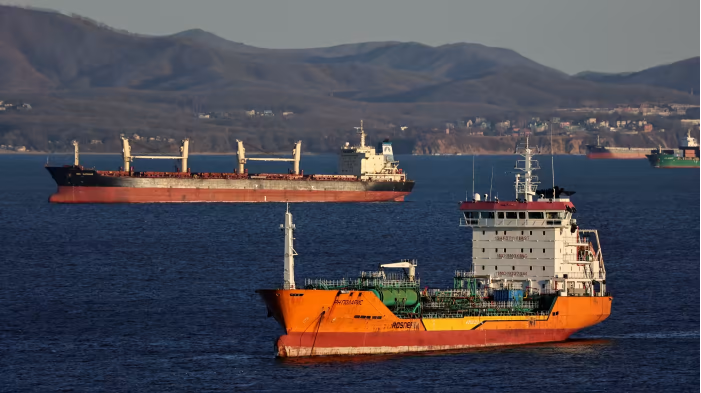
An oil tanker and bulk carrier are seen near the Russian port of Nakhodka in December.
ISLAMABAD -- Pakistan is poised to import oil from Russia, with the first order expected to be unloaded in May, in a move that promises to save the cash-strapped country money but also raises several questions and challenges.
Pakistan placed the order this month, according to Musadik Malik, the minister of state for petroleum. The imported oil will initially be refined by Pakistan Refinery, which is owned by the government. If all goes well, the intention is to ramp up imports to 100,000 barrels per day, making up two-thirds of Pakistan's total oil purchases.
The government has not disclosed the financial details, but it is hailing the deal as an economic relief.
A government official, who requested anonymity because he is not authorized to speak to the media, said Islamabad aims to buy Russian oil at $50 a barrel. Arab Light oil, which Pakistan is mainly purchasing from Saudi Arabia, was recently trading at $84.75 per barrel.
Experts were skeptical about whether Pakistan can actually secure such a discount. But lower prices would certainly help a country that paid $18.74 billion for all kinds of petroleum products in fiscal 2022, according to the State Bank, as it sank into a foreign exchange crisis and was forced to seek assistance from the International Monetary Fund.
Even if the arrangement helps Pakistan breathe easier, experts see a number of potential issues.
One is the risk of a U.S. backlash, particularly if Pakistan ends up purchasing oil from Russia above the $60 per barrel cap imposed by the Group of Seven as part of penalties on Moscow over its invasion of Ukraine.
Pakistani Prime Minister Shehbaz Sharif's government has sought to mend fences with the U.S. as it confronts the economic crisis as well as surging terrorism.
Derek Grossman, a senior defense analyst at Rand Corp., said U.S. policymakers might come down harder on Islamabad rhetorically and diplomatically by postponing meetings, although he said sanctions are probably not in the cards.
Michael Kugelman, director of the South Asia Institute at the Wilson Center, said Islamabad will hope that Washington understands this purchase is being made to help ease its acute economic problems. "I don't anticipate sanctions, but Pakistan's disadvantage is that it lacks the shield of a strategic partner, which would allow it to get free passes, as is the case with India," he said.
India -- a member of the Quadrilateral Security Dialogue with the U.S., Japan and Australia -- has significantly increased its dependence on Russian oil since the Ukraine war began.
A second challenge is that Russia will sell Pakistan unrefined oil, which will test the limited capacity of the importer's refineries. Aftab Zafar, an oil adviser in Islamabad, said that refining the Russian crude will cost between $2 and $5 per barrel, eating into the savings.
Moreover, the crude Russia is selling yields more furnace oil, versus diesel.
Diesel is mostly used by the transportation sector whereas furnace oil is mainly used by power plants. According to the Oil and Gas Regulatory Authority's Report on the Regulated Petroleum Industry 2020-21, diesel made up 39% of Pakistan's oil consumption, and furnace oil was just 15%. This suggests Pakistan will end up with more furnace oil than it needs.
Still, G.A. Sabri, a retired federal secretary for petroleum and natural resources, told Nikkei Asia that before placing such a huge order, Pakistan Refinery must have carried out its due diligence and made sure that the arrangement is feasible.
Sabri, who served for more than three decades dealing with Pakistan's petroleum sector, said the country could export the additional furnace oil below the market rate to earn revenue, helping to offset the additional refining costs.
But there is also a third challenge: Russia is reportedly asking for payment in its own rubles, Chinese yuan or United Arab Emirates dirham. Pakistan is not known to have reserves of these currencies. Neither Moscow nor Islamabad has said how they have agreed to work around this.
Bangladesh recently decided to pay Russia for a nuclear power plant in yuan, but it had been accumulating at least some of the Chinese currency.
Pakistan has little wiggle room, with foreign reserves of just $4.43 billion as it anxiously attempts to secure a deal with the IMF for a $1.1 billion tranche. That could help unlock other sources of funding.
Kugelman suggested Pakistan may be counting on credit or a loan from Russia, though he said the last thing Islamabad needs now is more debt.
Experts offered mixed assessments of the future prospects.
"The Pakistan government is importing Russian oil as a test run and they are exploring the feasibility of this arrangement," said oil expert Zafar. In his view, the government may not be completely sure of the arrangement working out.
Sabri, the former petroleum secretary, suggested that the arrangement with Russia could be deferred if it proves too complicated.
Kugelman said that this transaction is quite delicate for Islamabad. "Pakistan badly needs cheap oil, but it also doesn't want to antagonize key Western trade partners," he said, saying the government "will need to proceed carefully."